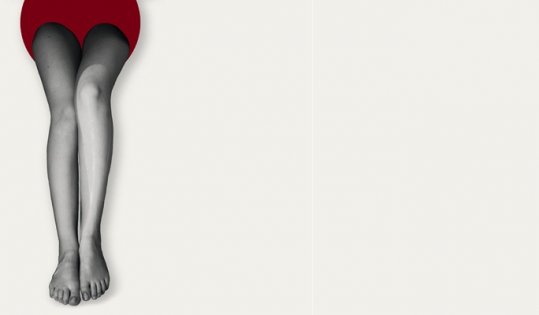Freedom, equality, sanitary towel

Michalina, a candidate for student government, recently hung up a poster at school: "School is our second home, so I would like us to feel homely. I came up with some ideas that could make this happen. Here are some of them: hygienic products in all the ladies' toilets in school. Often periods come when you least expect them, and we are not prepared for that. Some of us are ashamed to ask our school friends for sanitary towels or tampons (…)". That was enough, the headmistress called the girl into her office. "This poster is vulgar," she heard. Also, it crosses the boundaries of privacy. She ought to change its content immediately. She should feel ashamed that she is writing about such things. After all, Polish schools are a place where one does not talk about menstruation. Where the students' ignorance of sexuality is not outrageous, but on the contrary, such content causes offence and should not be present at school. Nobody cares how teenagers look for information on the subject. And that some of them may not be able to afford sanitary towels or tampons. That there are girls in Poland who put cut up t-shirts or toilet paper in their underwear. And stained trousers are covered with a blouse. That they don't want to go to school or leave home because of it. That they start to dislike each other. That they have complexes and a lower sense of value.
But there are also teenagers like Michalina. And Michalina told the headmistress that she will not change the poster. She wants to normalise the subject of menstruation, demystify and deconstruct it.
"You might as well have hung a bloody sanitary towel on the wall," the director retorted.
Why do we have such a big problem with talking about menstruation in public spaces? What is the explanation behind the resistance of women themselves?
Because female physiology, menstrual bleeding associated with menstruation, is still considered dirty, unsightly and uncool. The blood in films that draw teenagers in is no longer outrageous. But blood stains on trousers disgust us. Or a drop of blood left unintentionally in the bathroom.
More than half the women in Poland are ashamed of their period. She is your friend, mother, daughter, neighbour. For them, a blood stain becomes a tragedy. Forty percent of us sneak into the toilet so that no one will notice that we are holding a sanitary towel or tampon in our hand. Every third woman in Poland does not want anyone to know that she is on her period.
What were we taught? A stain on your trousers - cover it with a shirt. A red mark on the sheets - sneak through the house with them so that no one in the household notices, wash as soon as possible. Buying tampons? Put them at the bottom of the basket so no one can see. At work, a colleague whispers if she can borrow a sanitary towel. At home, the tampons are never in plain sight. You hide your menstrual cups in your underwear. Sanitary towels are thrown away so that nobody sees them in the bin. I know a girl who was told to burn them in the oven (she lived at home) so that her brothers wouldn't find out that she was on her period. After all, a woman should be clean, groomed, she does not burp, she does not speak too loudly and does not expose anyone to the sight of disgusting blood, right?
We are constantly trying to deny menstruation, to hide it. We do not talk about it at home, we do not hear about it at school. And in bringing up a family, girls are told that it is a sin to use tampons because they must not have contact 'with that part of the body', they must not touch it. They are afraid of diseases, complications during pregnancy and difficulties in childbirth. Shame is a great tool for controlling and disciplining women. It still allows you to have power over them.
Marta Majchrzak, a sociologist, has recently carried out projects that concern underage women, their adolescence and menstruation. What shocked her the most was the conversations she had with 14-year-olds, who said that when they have a period, they regret being women. It is then difficult for them not to envy men, because they are so pained, so embarrassed, and often humiliated by their physiology so much that they hate themselves for it.
Some teenagers in Poland do not know what menstruation is (yes, there are still such girls, and next week we will write about them in ‘Wysokie Obcasy’). They see blood between their legs and experience shock. The only thing that comes to their mind is to hide. And check the Internet. They do not mention the blood to their relatives, because they do not know how. Because to talk about menstruation, you need a safe space.
But we have not talked about menstruation for years. Why? Because we were brought up in such a way that it would be an embarrassing subject, so that we could conceal and hide our period, and speak about it in whispers and codes: ‘I have you know what’, ‘I have these days’. We were supposed to deal with it sneakily, so that no one else would notice. So that brothers or fathers wouldn't notice at home (they might get embarrassed, we can’t subject them to that!), and colleagues at meetings.
Sometimes you might hear: ‘What are you so stressed out? Don't approach her, I think she has PMS’, ‘Seems it’s that time of the month’, ‘Do you have premenstrual tension? What is happening to you?’. Periods are still a reason to humiliate women and girls. Where does this sham come from? It comes from the eye of the beholder.
However, Kamila Raczynska-Chomyn, a sex educator, has good news for us. She speaks today in ‘Wysokie Obcasy’ about a new generation of young, 20-year-old Polish men who have no problem with menstruation. Have you got your period, have you got blood on the sheets? Don't worry, we will wash it. They save up money for menstrual cups. They will bring you a hot water bottle when your stomach hurts. Sure, there aren't many of them, but there used to be hardly any. They don't get embarrassed by blood. And we shouldn't, any more.
Monika Tutak-Goll
The text was published in "Wolna Sobota” of "Gazeta Wyborcza” on 17 October 2020


